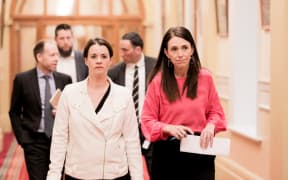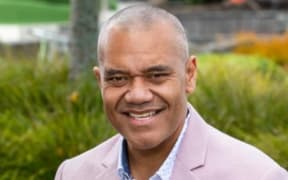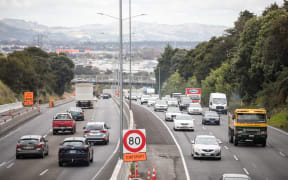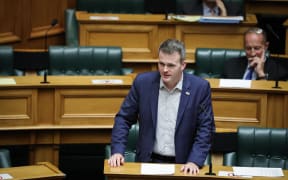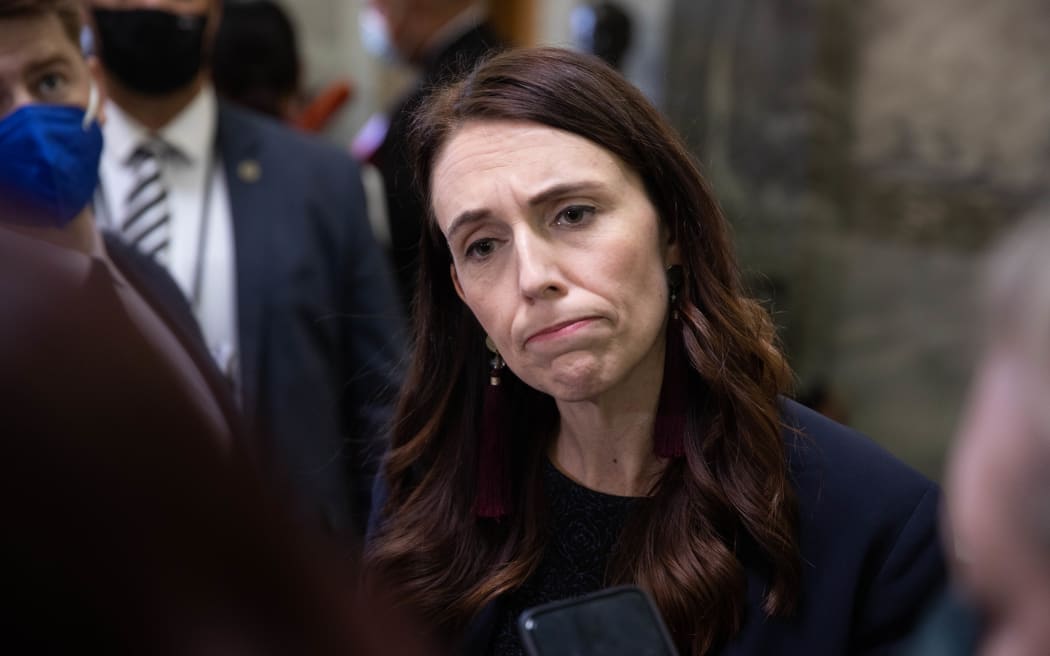
Prime Minister Jacinda Ardern. Photo: RNZ / Angus Dreaver
Analysis - National security was front and centre this week with Prime Minister Jacinda Ardern saying New Zealand needs to plan its own response to terrorist threats; National defends its proposed tax cuts against a CTU analysis and the party's Hamilton West by-election shortlist is likened to a "white man ban".
The first draft national security insights briefing was released at the beginning of the week followed by a two-day hui on countering terrorism.
The insight briefing's stark assessment was that disinformation will further drive divisions in New Zealand, threatening democracy and national security, and cyber attacks will be more frequent, Stuff reported.
Prime Minister Jacinda Ardern said its release was an opportunity to talk openly about the most significant threats New Zealanders were concerned about for the next decade, as well as the work being done to combat and prepare for those risks.
The briefing was put together by the Department of Prime Minister and Cabinet and the Ministry of Foreign Affairs and Trade on behalf of the Security and Intelligence Board, a group of senior public sector chief executives.
Board chair Tony Lynch said the rapid spread of misinformation and disinformation, collective understanding of national security threats and the ability to respond to them was being constantly tested.
Country-sponsored disinformation posed a particular challenge because it could form "sophisticated and sustained" campaigns using vast and specialist resources.
The draft briefing is out for public consultation. The government is developing a National Security Strategy and is reviewing national security systems, functions and form - a recommendation from the Royal Commission into the 15 March terrorist attacks in 2019.
(At this point it's worth defining misinformation and disinformation, because they sound the same and they're easily confused. Here's Wikipedia's explanation: "Disinformation is false information deliberately spread to deceive people. It is sometimes confused with misinformation, which is false information but is not deliberate. Only disinformation is wrong on purpose."
The Reader's Digest makes the same distinction and says disinformation is typically used, among other things, to sow chaos and confusion.)
The release of the briefing was followed by the hui in Auckland, attended by the prime minister and members of the Māori, Pasifika, Jewish, Muslim, Rainbow and many other communities, RNZ reported.
Ardern said it was very clear it wasn't enough to just "pick up" how other countries responded to terrorism.
"We need to make very sure our response is very much a New Zealand response," she said.
New Zealand was a country which didn't believe in mass surveillance and Kiwis protected and deeply guarded their privacy and freedom.
Ardern said it was important to have a response that identified and acknowledged that potential radicalisation was often "very individualised" and it was important to look at the signs an individual may be showing rather than just focusing on ideology.
Representatives of community groups spoke, with the widow of a 2019's terrorist attack victim saying that since then things had not improved for New Zealand's Muslims.
The full report is on RNZ's website.
CTU's analysis of National's tax cuts rejected by party leaders
An analysis of National's proposed tax cuts by the CTU caused a flurry this week with party leaders trying to shoot it down.
National has pledged to index tax thresholds to inflation if it wins the next election and abolish the 39 per cent top tax rate on income over $180,000.
CTU economist Craig Renney said the tax cuts were heavily weighted towards high income earners, Stuff reported.
Examples he gave were the prime minister, earning $471,049 a year, could expect a tax cut of $349 a week.
For a couple earning $250,000 a year each, the tax cut would be worth $188 a week.
By contrast, two workers earning $50,000 each would receive $4.30 a week.
"More than half of taxpayers would receive either $2 a week or nothing at all," Renney said.
Finance Minister Grant Robertson said National's proposals were "uncosted, unfunded and unfair".
National's deputy leader and finance spokesperson Nicola Willis said she completely rejected Renney's figures, which included calculations on how much the tax cuts would cost.
"They are based on a number of false assumptions including about aspects which are not in our tax plan and that the entire plan will be rolled out immediately," she said.
"We question the motivations of the analyst, given his immediate previous role was a political adviser to the finance minister."
Party leader Christopher Luxon also dismissed the claims.
He told Morning Report he didn't accept the figures. The core part of the policy was to inflation-adjust tax thresholds as many other developed countries did.
"We're not changing the tax system in New Zealand: It's a progressive tax system, the top 10 per cent of taxpayers pay over 40 per cent of our income tax in this country," he said.
"We're just saying, take the current progressive tax system, for goodness' sake, and do what many developed countries around the world (do),"
Luxon said the current government had raised $15,000 per household in extra tax by not adjusting the thresholds.
National's by-election shortlist likened to a 'white man ban'
The Herald's political editor Claire Trevett reported on what went on behind the scenes before National announced its shortlist for the Hamilton West by-election.
It has named three candidates - Rachael Afeaki-Taumoepeau, Frances Hughes and Tama Potaka.
Local party members will make the final choice.
Trevett said Luxon's call for party members to inject some diversity into selections clearly did the trick.
"It resulted in some almost comical twists to the selection for Hamilton West - twists that will be making other white man hopefuls lining up for National nervous," she said.
Trevett said Luxon's credibility was on the line after his earlier, milder suggestion that the Tauranga by-election might deliver diversity was completely ignored and the shortlist was four white men.
"This time the party didn't want to take any risks of a repeat, so the party appeared to decide the only sure-fire way to ensure diversity in Hamilton West was to remove all temptation of a white male candidate completely," she said.
"In its effect, it is perilously close to the territory of Labour's proposed 2013 'man ban' - that was a proposal to only allow women to stand in some electorates. It was controversial and then leader David Shearer dumped it."
Trevett said National's Hamilton West equivalent would be the "white man ban".
She said the party had "quiet words" and took out the two white male candidates.
"Within a week of Luxon's statement one of the two white men looking at the seat decided not to stand. That was former MP Tim Macindoe, who up until that moment had wanted to return," she said.
"He made it easy for National - Andrew King should have read the sign but it was a few more days before news trickled out King too was out of contention."
Trevett said the result was that the party delegates now had no choice other than some diversity - two women, one of whom was Pasifika, or a Maori man.
"All of this focus on diversity - to the point of leaving white males out - will make some of the National Party base squirm," Trevett said. "So-called identity politics is supposed to be Labour's game."
Government faces more opposition to Three Waters
The government's Three Waters proposals ran into more trouble this week as three mayors put up an alternative and one said plan that's on the table was too divisive to succeed.
Auckland mayor Wayne Brown, Christchurch mayor Phil Mauger and Waimakariri mayor Dan Gordon believe their plan would build consensus across the country, RNZ reported.
Gordon said on Morning Report the group hoped other mayors, local councils, the government and opposition parties would look at it.
"The critical aspect is that councils maintain their effective management and control and that is the crux of the issue for all our communities," he said.
"No one's arguing that we don't want to have a water regulator in place and that we want great water quality.
"But we say the way this has been gone about - the entity model - has just created huge division."
Under the Three Waters proposal, four huge regional entities will take over water infrastructure from councils and run it.
Brown has already said Three Waters is "doomed" and told Auckland Council officials to stop work on it.
At her post-cabinet press conference on Monday, Ardern said the government was prepared to consider "refinements".
The Three Waters legislation is with a select committee which is considering submissions on it. She said it should be allowed to finish its work.
*Peter Wilson is a life member of Parliament's press gallery, 22 years as NZPA's political editor and seven as parliamentary bureau chief for NZ Newswire.

